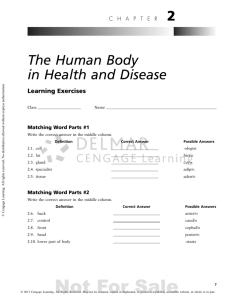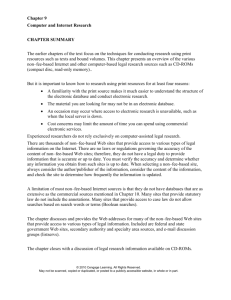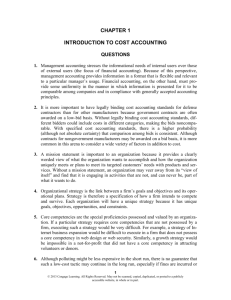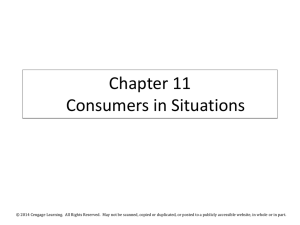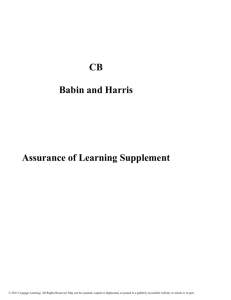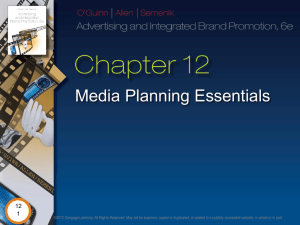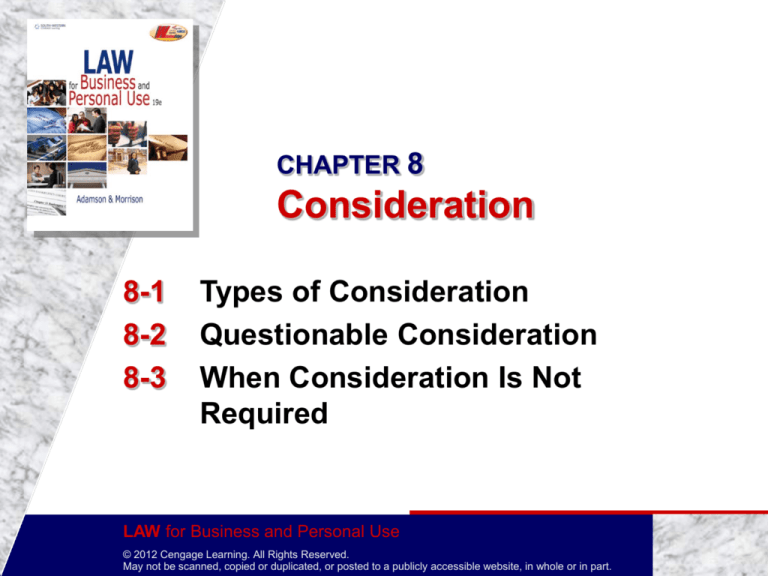
CHAPTER 8
Consideration
8-1
8-2
8-3
Types of Consideration
Questionable Consideration
When Consideration Is Not
Required
LAW for Business and Personal Use
© 2012 Cengage Learning. All Rights Reserved.
May not be scanned, copied or duplicated, or posted to a publicly accessible website, in whole or in part.
8-1
Types of Consideration
GOALS
Identify the three requirements of consideration
Discuss the adequacy of consideration
LAW for Business and Personal Use
Chapter 8
© 2012 Cengage Learning. All Rights Reserved.
May not be scanned, copied or duplicated, or posted to a publicly accessible website, in whole or in part.
SLIDE 2
CONSIDERATION
Three Requirements for Consideration
1. Promise, act, or forbearance
2. Contractual exchange
3. Legal value
LAW for Business and Personal Use
Chapter 8
© 2012 Cengage Learning. All Rights Reserved.
May not be scanned, copied or duplicated, or posted to a publicly accessible website, in whole or in part.
SLIDE 3
Adequacy of consideration
Consideration
Economic value is unimportant as long as there is
genuine agreement.
The values that different people place on the
same property may vary widely.
Nominal consideration
In certain written contracts, such as publicly
recorded deeds, consideration from one party
may be identified as one dollar ($1.00), and other
good and valuable consideration. In such
situations the actual consideration may be
substantially more. However, the parties either
cannot state the amount precisely or do not want
to publicize it.
LAW for Business and Personal Use
Chapter 8
© 2012 Cengage Learning. All Rights Reserved.
May not be scanned, copied or duplicated, or posted to a publicly accessible website, in whole or in part.
SLIDE 4
What’s your verdict?
John a writer, gets a call from his editor and
consequently has to leave immediately on a
research trip to Hudson Bay and
Newfoundland in Canada.
As the trip should take a couple of weeks, he
leaves a note offering to pay his neighbor,
Jordan, $100 to watch his house, feed and
walk his dog.
John then leaves without ever speaking to
Jordan.
Jordan gets the note and complies.
LAW for Business and Personal Use
Chapter 8
© 2012 Cengage Learning. All Rights Reserved.
May not be scanned, copied or duplicated, or posted to a publicly accessible website, in whole or in part.
SLIDE 5
What is your verdict
Is there an enforceable contract?
What was the consideration for each party.
LAW for Business and Personal Use
Chapter 8
© 2012 Cengage Learning. All Rights Reserved.
May not be scanned, copied or duplicated, or posted to a publicly accessible website, in whole or in part.
SLIDE 6
Consideration
When looking for consideration, look for legal
value in the underlying act that is promised.
If someone promises forbearance—or not to
do something. Look beneath the promise
and ask if the forbearance has legal value.
LAW for Business and Personal Use
Chapter 8
© 2012 Cengage Learning. All Rights Reserved.
May not be scanned, copied or duplicated, or posted to a publicly accessible website, in whole or in part.
SLIDE 7
CHECKPOINT
List the three requirements of consideration.
1. Promise, act, or forbearance
2. Contractual exchange
3. Legal value
LAW for Business and Personal Use
Chapter 8
© 2012 Cengage Learning. All Rights Reserved.
May not be scanned, copied or duplicated, or posted to a publicly accessible website, in whole or in part.
SLIDE 8
8-2
Questionable Consideration
GOALS
Describe situations in which consideration is
present only under limited circumstances
Recognize when what appears to be binding
consideration is not
LAW for Business and Personal Use
Chapter 8
© 2012 Cengage Learning. All Rights Reserved.
May not be scanned, copied or duplicated, or posted to a publicly accessible website, in whole or in part.
SLIDE 9
CIRCUMSTANTIAL
CONSIDERATION
Illusory promises – if a contract contains a clause
that allows you to escape the legal obligation
Termination clauses
Output and requirements contracts
Existing duty – a person promises to do something
that he or she already is obligated to do by law or by
prior contract. Cannot serve as consideration.
Existing public duty
Existing private duty
Settlement of liquidated debts
Settlement of unliquidated debts
Release
Composition of creditors
LAW for Business and Personal Use
Chapter 8
© 2012 Cengage Learning. All Rights Reserved.
May not be scanned, copied or duplicated, or posted to a publicly accessible website, in whole or in part.
SLIDE 10
Release – example
David was entering an intersection in his car when a
garbage truck ran a red light and hit him. The garbage
truck company’s insurer paid the property damage
immediately. However, the insurer refused to pay for
David’s personal injuries due to the inability to get a
definitive MRI of David’s neck and spine. David,
claiming to be unable to work at his previous well-paying
job as a fork-lift operator, sued.
Three years after filing suit, David’s financial situation
was desperate. Knowing this, the insurer offered a
settlement of $10,000. David took it and signed a release
discharging the garbage truck company from further
liability.
LAW for Business and Personal Use
Chapter 8
© 2012 Cengage Learning. All Rights Reserved.
May not be scanned, copied or duplicated, or posted to a publicly accessible website, in whole or in part.
SLIDE 11
CHECKPOINT
Why is consideration not binding in illusory
contracts?
LAW for Business and Personal Use
Chapter 8
© 2012 Cengage Learning. All Rights Reserved.
May not be scanned, copied or duplicated, or posted to a publicly accessible website, in whole or in part.
SLIDE 12
FALSE CONSIDERATION
Mutual gifts - when something of value is
given by one party to another without
demanding anything in return, the something
of value is not consideration for anything
later promised or provided
Past consideration – an act that has already
been performed cannot be consideration for
later.
LAW for Business and Personal Use
Chapter 8
© 2012 Cengage Learning. All Rights Reserved.
May not be scanned, copied or duplicated, or posted to a publicly accessible website, in whole or in part.
SLIDE 13
What’s your verdict?
Using an extremely strong and lightweight
composite material, Databuster Inc., created
the Slice, a notebook computer weighing
less than one pound with a 17” screen.
The Slice immediately grabbed a majority
share of the notebook computer market.
To ensure a steady supply of
microprocessors for the production of the
Slice, Databuster contracted to buy computer
chips form the Chipshop.
LAW for Business and Personal Use
Chapter 8
© 2012 Cengage Learning. All Rights Reserved.
May not be scanned, copied or duplicated, or posted to a publicly accessible website, in whole or in part.
SLIDE 14
What’s your verdict?
The Chipshop in turned geared up two new
production lines to meet Databuster’s
demand.
Barely eight months later, Databuster
learned of a new company offering a chip
that produced twice the speed—and cost half
the price—of the Chipshop’s chip.
Databuster started buying all the chips it
needed to manufacture the Slice from this
new company.
The Chipshop brought suit for breach of
contract. Did they win?
LAW for Business and Personal Use
Chapter 8
© 2012 Cengage Learning. All Rights Reserved.
May not be scanned, copied or duplicated, or posted to a publicly accessible website, in whole or in part.
SLIDE 15
CHECKPOINT
What distinguishes a gift from a valid
contract?
LAW for Business and Personal Use
Chapter 8
© 2012 Cengage Learning. All Rights Reserved.
May not be scanned, copied or duplicated, or posted to a publicly accessible website, in whole or in part.
SLIDE 16
8-3
When Consideration Is Not
Required
GOALS
Distinguish situations in which consideration is
not needed
Recognize when the doctrine of promissory
estoppel can be applied
LAW for Business and Personal Use
Chapter 8
© 2012 Cengage Learning. All Rights Reserved.
May not be scanned, copied or duplicated, or posted to a publicly accessible website, in whole or in part.
SLIDE 17
EXCEPTIONS TO THE REQUIREMENT
OF CONSIDERATION
Promises to charitable organizations
Promises covered by the UCC
Firm offers – merchant who makes an offer to buy
goods and services.
Modifications – need consideration. Under the
UCC, however, a good-faith agreement hat
modifies an existing contract for the sale of
goods, needs no new consideration
LAW for Business and Personal Use
Chapter 8
© 2012 Cengage Learning. All Rights Reserved.
May not be scanned, copied or duplicated, or posted to a publicly accessible website, in whole or in part.
SLIDE 18
EXCEPTIONS TO THE REQUIREMENT
OF CONSIDERATION
Promises barred from collection by statute
Statute of repose and limitations – specifies a
time limit for bringing a lawsuit once you become
aware of a legal claim.
In many states the term of the statue repose is 12 years
Breach of contract – 2 years
Debts discharged in bankruptcy
LAW for Business and Personal Use
Chapter 8
© 2012 Cengage Learning. All Rights Reserved.
May not be scanned, copied or duplicated, or posted to a publicly accessible website, in whole or in part.
SLIDE 19
EXCEPTIONS TO THE REQUIREMENT
OF CONSIDERATION
Promissory estoppel – prevents promisors
from stating in court that they did not receive
consideration for their promises.
LAW for Business and Personal Use
Chapter 8
© 2012 Cengage Learning. All Rights Reserved.
May not be scanned, copied or duplicated, or posted to a publicly accessible website, in whole or in part.
SLIDE 20
EXCEPTIONS TO THE REQUIREMENT
OF CONSIDERATION
For the courts to enforce promissory
estoppel the following conditions must be
met.
1. The promisor should reasonably foresee that the
promise will rely on the promise
2. The promisee does, in fact, act in reliance on the
promise.
3. The promise would suffer a substantial economic
loss if the promise is not enforced
4. Injustice can be avoided only by enforcement of
the promise
LAW for Business and Personal Use
Chapter 8
© 2012 Cengage Learning. All Rights Reserved.
May not be scanned, copied or duplicated, or posted to a publicly accessible website, in whole or in part.
SLIDE 21
CHECKPOINT
Name four exceptions to the requirement of
consideration.
Promises to Charitable Organizations
Promises Covered by the UCC
Promises Barred from Collection by Statute
Promissory Estoppel
LAW for Business and Personal Use
Chapter 8
© 2012 Cengage Learning. All Rights Reserved.
May not be scanned, copied or duplicated, or posted to a publicly accessible website, in whole or in part.
SLIDE 22
PREVENT
LEGAL
DIFFICULTIES
Remember that under contract law . . .
Generally both parties must give and receive
consideration if their agreement is to be
enforceable as a contract.
Adequacy of consideration generally is immaterial
to whether or not a contractual promise is
enforceable.
Continued on the next slide
LAW for Business and Personal Use
Chapter 8
© 2012 Cengage Learning. All Rights Reserved.
May not be scanned, copied or duplicated, or posted to a publicly accessible website, in whole or in part.
SLIDE 23
PREVENT
LEGAL
DIFFICULTIES
Accepting money in exchange for giving up a
legal right constitutes consideration and is
binding. Consult a lawyer before making such an
agreement in any major dispute.
A pledge to a charitable institution is generally
binding without consideration and should not be
made unless you intend to fulfill it.
Continued on the next slide
LAW for Business and Personal Use
Chapter 8
© 2012 Cengage Learning. All Rights Reserved.
May not be scanned, copied or duplicated, or posted to a publicly accessible website, in whole or in part.
SLIDE 24
PREVENT
LEGAL
DIFFICULTIES
Generally, however, promises to make gifts
cannot be enforced by the intended donee.
You should use care and good judgment in
making contracts. Courts generally will not rescue
you from “bad bargains” or unfavorable deals
voluntarily made.
LAW for Business and Personal Use
Chapter 8
© 2012 Cengage Learning. All Rights Reserved.
May not be scanned, copied or duplicated, or posted to a publicly accessible website, in whole or in part.
SLIDE 25



